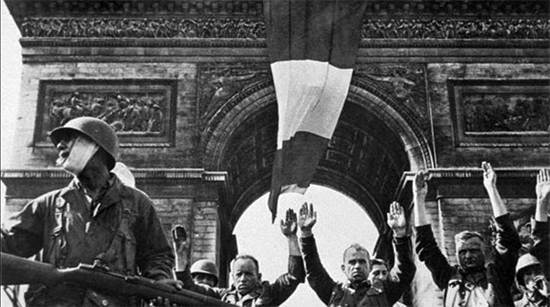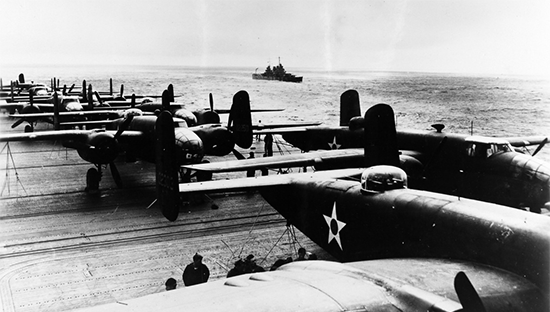
February-
March 2015
Living Trust
------------------
|

Necessary Spurs
By David Brown
In June 1942, the world was embroiled in World War II, and things weren’t going well for the Allies. Most of France had been occupied by Nazi Germany. Great Britain, though remaining free, had endured heavy bombing by the German Luftwaffe. The United States had been bombed by Japan six months earlier, with several battleships destroyed or damaged.
Sometimes, those of us who weren’t alive during World War II don’t realize how precarious the fate of the world was during this time. On June 12, 1942, Royal Air Force Wing Commander Ken Gatward was asked to volunteer for an “unsafe” mission. He and his navigator, Flight Sargent George Fern, were chosen for the assignment because they had demonstrated skill in accurate flying at low altitude during attacks against German positions at Dunkirk. The British had learned that the Nazis were holding daily parades down Champs-Elysees, a main thoroughfare in Paris, to demonstrate their power over the French and to demoralize any resistance.
Gatward was instructed to fly down Champs-Elysees, use a chute to drop the French flag on the Arc de Triomphe, then drop to second-floor level—about 20 feet off the ground—and strafe the parade with 20mm guns before shooting up Gestapo headquarters at the end of the street.
His “mission impossible” was a success. He accomplished his objectives and returned home safely. He was awarded the Distinguished Flying Cross by Great Britain and honored as a French hero after the war.
Did this mission accomplish anything strategically to help end the war? No, but it accomplished a very important objective. It boosted the morale of the French underground resistance and boosted the morale of British citizens everywhere. The Germans wanted everyone to think they were invincible, that their goal of world domination was inevitable. Ken Gatward’s courageous foray down the Champs-Elysees reminded everyone, including the Germans, that they were not invincible. In the language of the writer of Hebrews, you might say his actions “provoked the Allies to good works” in the war against Germany.
The word translated provoke needs a little explanation. The Greek word paroxusmon is literally “beside sharpening” and has been translated spur, incite, stir up, motivate, and provoke. What are ways we can spur one another on toward love and good works?
Heroic actions. Simple acts of courage can affect hundreds, thousands, even millions of people. Consider the most familiar example from Scripture, when David confronted and killed Goliath as recorded in 1 Samuel 17. Perhaps you remember the story. Israel and the Philistines were prepared for conflict, with their armies lining the Valley of Elah. Each day, the giant Goliath challenged the warriors of Israel to fight, but no one was brave enough to take his challenge. The Israelite troops were demoralized, dismayed, and terrified. Each day, when Goliath made his challenge, they ran from him in great fear.
But when young David faced the giant, killed him with a simple sling, and then cut off his head, they surged forward with a shout and pursued the Philistine army all the way to Goliath’s hometown of Gath, some seven miles to the west. His single heroic act spurred the entire army of Israel to a great victory.
Now, I realize that acts of heroism are few and far between, and most will never experience an opportunity to perform a heroic act of this magnitude, but some might. And even if we do not find ourselves in a position to commit a heroic act that spurs others on, we all can benefit by observing and teaching the heroic acts of others.
Consider the story of missionary Jim Elliot, who died at the hands of Auca Indians in 1956. His testimony continues to spur missionaries to spread the gospel, even in the hard and dangerous places. Read about martyrs from the early days of Christendom…or simply watch the news to witness heroes of the faith standing tall in our world. Heroic acts of faith, even martyrdom, continue today, and these actions should spur us toward our own works of courage for the cause of Christ.
Encouraging words. Proverbs 25:11 reminds us, “A word fitly spoken is like apples of gold in pictures of silver.” A word of encouragement at just the right time can change someone’s life. You may think you never know the right thing to say, but if you stay in God’s Word and remain sensitive to His Holy Spirit, God can use you to say just the right thing at just the right time.
I have encountered some great encouragers in my lifetime. During my time at Welch College, Bert Tippett encouraged me as he did so many others. He encouraged me to stretch myself, to do things I didn’t know I could do. Jack Williams is another great encourager who continues to spur me on to good works that I cannot imagine doing. Unfortunately, we live in a world where it is more popular to tear one another down. Don’t fall into that trap! Be an encourager, and you will spur others on to good work.
Slapped serious. The Greek word translated provoke includes an element of anger—the idea that sometimes we may need to correct one another firmly to get us back on the path to love and good deeds. Sometimes, we may need to make someone angry to get his or her attention. Have you ever been angry with a friend who set you straight? Swallow hard and think again as you remember the words of Proverbs 27:6a: “Faithful are the wounds of a friend.”
A good friend will not let you go astray, even if confrontation hurts. Why? His intent is to spur you on, to correct you in love. The truth hurts, but the truth also heals. I have had a number of “slaps up side the head” in my lifetime, both figuratively and literally. And while they hurt at the time, ultimately, they helped. We all need friends who hold us accountable for our own impossible missions.
Two weeks after the Pearl Harbor attack in 1941, President Roosevelt met with the Joint Chiefs of Staff at the White House to express a desire that Japan be bombed as soon as possible. He wanted to boost American morale after the disaster at Pearl Harbor.
Many of the Joint Chiefs told him it was impossible. The President insisted, and a plan was formulated. Lieutenant Colonel James Doolittle led the mission that came to be known as “Doolittle’s Raid.” On April 18, 1942, 16 B-25 bombers (below) were launched from the aircraft carrier USS Hornet in the Pacific Ocean about 650 miles from Japan.

It was a desperate act. The bombers were stripped down to lower their weight. The lower gun turrets and rear guns were removed and replaced with black painted broomsticks. The planes took off from the aircraft carrier but could not land safely on the carrier. They had only enough fuel to make their bombing runs and turn west toward the coast of China, where they hoped to land before they ran out of gas. Each of the 16 bombers had four 500-pound bombs. At best, only 64 bombs would be dropped. Still, the planes were launched, and all but one dropped bombs on their assigned targets.
They all crashed, either in China or in the waters near China. Each plane had a five-member crew, a total of 80 men. Thirteen were killed, but 67 survived, not only this mission but until the end of the war. The damage done to Tokyo and four other Japanese cities was no more than a pinprick in the scope of the War in the Pacific. Doolittle speculated that he would be court-martialed for losing 16 planes while inflicting minimal damage.
Was it worth it? Yes! The daring raid demonstrated to the Japanese empire that they were vulnerable to attack, and that perhaps they shouldn’t put too much faith in their leaders. It forced the Japanese navy to reposition their ships to protect the homeland. But most important, when it was reported “back home” that the United States had bombed Tokyo, it tremendously boosted the morale of the American people. Doolittle was not court-martialed; instead, he was awarded the Medal of Honor by President Roosevelt and promoted to Brigadier General. All 80 pilots were awarded the Distinguished Flying Cross, and their actions spurred us on through the long and difficult war.
Let’s learn from these stories of heroism and spur one another on toward love and good deeds through heroic acts, encouraging words, and when necessary, a slap up side the head—necessary spurs for the sake of God’s Kingdom.
About the Writer: David Brown, CPA, became director of the Free Will Baptist Foundation in 2007. Send questions to David at david@nafwb.org. To learn how the Foundation can help you become a more effective giver, call 877-336-7575 or visit www.fwbgifts.org.
|
|

